
Government Jobs After 12th Passed with High Salary in India
Government jobs in India are highly sought after due to their stability, job security, and social prestige. Many students aspire to do Govt Jobs 12th grade. Here’s a detailed guide on various government job opportunities available for 12th pass candidates in India.
Government Jobs After 12th Grade
Government jobs after 12th Grade are available across various sectors such as defense, railways, banking, and more. These jobs offer a range of roles, from clerical positions to technical and operational roles. The recruitment process typically involves written exams, physical tests, and interviews.
Top Government Jobs After 12th
Staff Selection Commission (SSC):
Posts: Data Entry Operator (DEO), Lower Division Clerk (LDC), Postal Assistant/Sorting Assistant, Court Clerk, Stenographer
Exam: Combined Higher Secondary Level (CHSL)
Eligibility: Class 12, Indian citizenship, age 18-27 years.
Gross Salary: ₹18,000 – ₹22,000 per month
Indian Railways: Government Jobs after 12th (Non Technical)
Posts: Commercial cum Ticket Clerk, Account Clerk cum Typist, Trains Clerk, Junior Clerk cum Typist
Exam: RRB NTPC Under Graduate
Eligibility: Class 12, Indian citizenship, age 18-33 years.
Gross Salary: ₹35,000-39,000 per month (varies based on location and allowances)
Indian Air Force (Airmen/Airwomen):
Eligibility: 50% in class 12 from a recognized board, Indian citizenship
Role: Maintenance and repair of aircraft, weapons systems, radars, and specialty vehicles (Technical Group); administrative and logistical support (Non-Technical Group).
Gross Salary: ₹29,000 – ₹35,000 per month
RRB NTPC Exam Date, Syllabus, Exam Pattern, Latest Update
Agniveer After 12th Passed
Branches: Army, Navy, Air Force
Exam: Various recruitment rallies and exams depending on the branch
Eligibility: 10+2 (Intermediate) or equivalent, age 17.5-23 years (varies by branch)
Gross Salary: ₹31,000 – ₹35,000 per month (varies based on branch and allowances)
RRB NTPC 2025 Free Mock Test Only on Gyanvidya – Click Here
Indian Railway Loco Pilot (Assistant Loco Pilot):
- Exam: RRB Loco Pilot
Eligibility: Matriculation (10th class) plus ITI from recognized institutions of NCVT/SCVT, or Matriculation plus 3 years Diploma in Mechanical/Electrical/Electronics/Automobile Engineering
Gross Salary: ₹49,900 – ₹55,000 per month (varies based on experience and allowances)
SSC MTS (Multi-Tasking Staff):
Posts: Multi-Tasking Staff
Exam: SSC MTS Exam
Eligibility: Matriculation (10th class) from a recognized board, age 18-25 years (27 years for Havaldar positions)
Gross Salary: ₹28,000 – ₹32,000 per month
Railway Protection Force (RPF) Constable:
Exam: RRB RPF Constable
Eligibility: Matriculation (10th class) from a recognized board, age 18-28 years
Gross Salary: ₹29,000 – ₹35,000 per month (varies based on experience and allowances)
SBI Clerk 2024-25 Notification OUT
RRB Group D:
Posts: Track Maintainer, Helper, Assistant Pointsman, Hospital Assistant
Exam: RRB Group D Exam
Eligibility: Class 10 (High School) or ITI certification, age 18-33 years
Gross Salary: ₹25,000 – ₹32,000 per month
Preparation Tips for Government Jobs After 12th Grade
- Understand the Exam Pattern: Familiarize yourself with the syllabus and exam structure of the specific exam you are preparing for.
- Create a Study Plan: Allocate time for each subject and stick to your schedule.
- Use Reliable Study Materials: Refer to standard books and online resources.
- Practice Regularly: Solve previous year question papers and take mock tests.
- Stay Updated with Current Affairs: Read newspapers and follow current events.
Benefits of Government Jobs after 12th Grade
- Job Security: Government jobs offer stability and are less prone to economic fluctuations.
- Pension and Benefits: Employees receive pensions, medical benefits, and other perks.
- Social Prestige: Working in the public sector is often seen as prestigious and honorable.
- Work-Life Balance: Government jobs often have regular working hours and holidays.
Conclusion
Government jobs after 12th in India are a great way to start a career with stability and growth opportunities. With the right preparation and dedication, you can secure a rewarding position in the public sector. Good luck with your preparation and future endeavors!
How can I prepare for government exams after 12th?
- Preparation tips include:
- Understand the exam pattern and syllabus.
- Create a study plan and stick to it.
- Use reliable study materials and online resources.
- Practice with previous year question papers and take mock tests.
- Stay updated with current affairs





